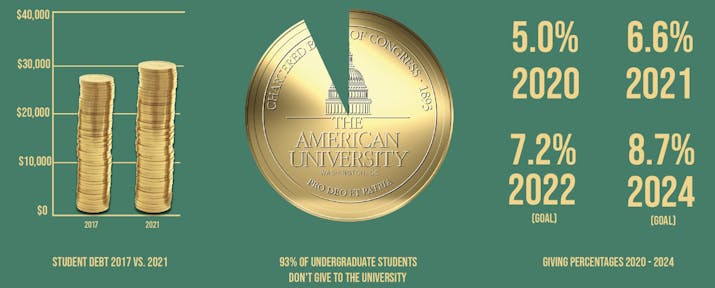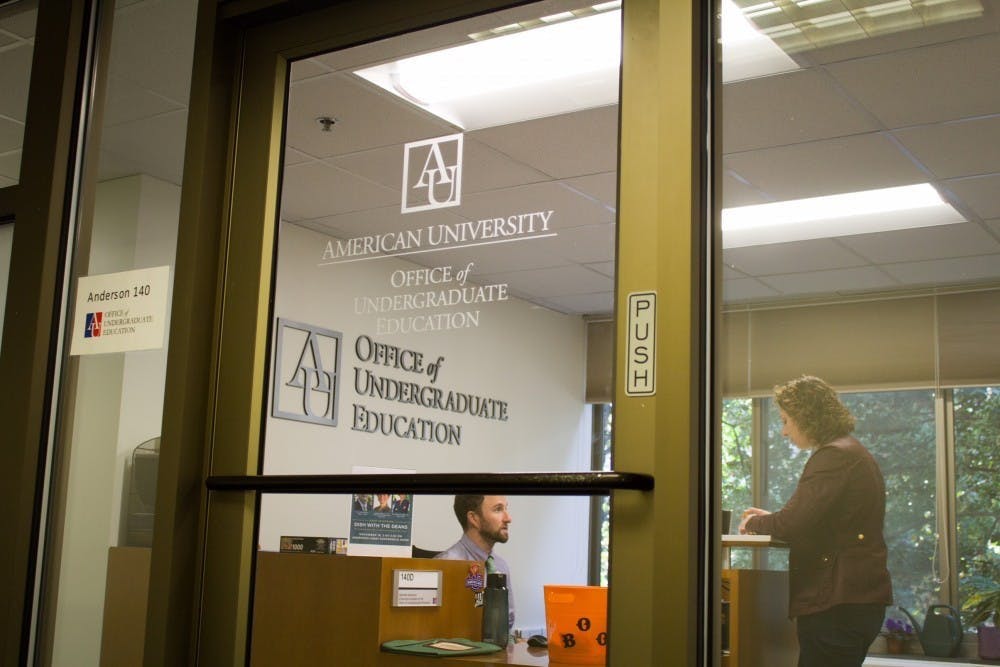From the Newsstands: This story appeared in The Eagle's April 2022 print edition. You can find the digital version here.
Impending student debt is a reality for about 60 percent of American University students. The majority of students who are in debt upon graduation owe between $20 and $25,000, according to the Financial Aid Office. About 80 percent of students receive some form of aid.
Almost immediately upon graduation, students begin receiving requests for donations from the University. For many, this can feel like a burden, especially when they are still paying off their
student debt.
“[When] you're 21 or 22-years-old, you're probably not in a position to immediately give back to the school that you just paid a lot of money to,” said Elijah Wolf, who graduated from the Kogod School of Business in 2021. “And I kind of just thought it was a bad look. What are we really doing asking such young kids to donate?”
Student debt and high tuition is a widespread problem in the U.S. A New York Times report
released in 2017, based on millions of anonymous tax filings and tuition records, showed that while some colleges are economically segregated, others better prepare their students to have upward mobility in income after graduation. The study also revealed that the median family income of a student from AU was $155,300.
The highest median family income for students at highly selective private colleges was $277,500 and the lowest was $63,600. AU ranked number 20 among these schools for median family income.
AU recently announced a 5 percent yearly tuition increase for the next two years, which, on top of national economic struggles relating to the coronavirus pandemic, makes the school less financially accessible.
In May 2021, the average student loan debt per undergraduate student in the U.S. was $31,100 at graduation, according to the Education Data Initiative. This number is up from $27,850 in 2017 when the study was done. As prices and debt have increased over the years, these statistics remain significant.
Thirty-six percent of AU students in the bottom fifth of income levels move to the top fifth after graduation. This number is significantly lower than that of other D.C. schools, such as GeorgetownUniversity, where this value is 61 percent, and George Washington University, where it is 42 percent. Both the Georgetown and GW student bodies have higher median family incomes than AU.
For students at AU, from 2014 to 2018, the four-year tuition cost about $179,700, according to the archived University catalog. The University does not actively target recent graduates specifically but makes an effort to reach out to everyone, according to Daniel Luperchio, assistant vice president of the Development Office of Development and Alumni Relations. The University benefits most from unrestricted donations from alumni. Approximately 93 percent of alumni do not donate to the University, Luperchio said.
“In [fiscal year 2020], AU’s undergraduate alumni giving rate was 5.0%. In [fiscal year 2021], it was 6.6%, exceeding a goal of 6.5%,” Luperchio wrote in an email to The Eagle. “This year’s goal is 7.2% so that we can continue increasing the percentage and ultimately reach 8.7% by the end of the ‘Change Can’t Wait’ campaign in June 2024.”

Alumni donations make up at least 18 percent of all gifts and pledges AU has received in the Change Can’t Wait campaign, not including donations made by trustees, many of whom are alumni, according to Luperchio.
School of Communication alumna Emily Tillett has a specific reason for why she doesn’t donate.
“I'm a very active and proud participant in the alumni community for SOC ... I feel like me donating my time to SOC is way more beneficial than me donating a couple hundred dollars. I alone cannot finance a new building,” Tillett said.
Tillett said that her parents were first contacted to donate to the University during her sophomore year.
“I think the tactic in which they approach asking for money needs to be retooled … a lot of people graduate with crippling debt, and think they need to approach this like they do,” Tillett said. “I just think that they should be utilizing the network of folks that are changemakers, not the children who aspire to become changemakers.”
Tillett said although she and her husband, also an AU alumnus, donate annually to a School of Public Affairs program that gave him the financial resources to stay in school, she does not frequently donate to the University. Tillett is still paying off her student loans and will be able to do so soon.
Many of the University’s grant programs and services to students are funded by alumni donations, even those that do not exceed $10, according to Luperchio. The average gift the University receives has been increasing annually and was $267 in fiscal year 2021.
Aside from direct requests from the University, the AU Phonathon is another method that the University uses to secure donations. The program enlists current students to call alumni, according to the Phonathon webpage. Student callers at Phonathon get paid $15.20 per hour to call and ask for donations from alumni.
“There are people like my husband, who was a college student trying to decide if he had to move back home or continue going to AU ... he paid off $200,000 worth of student loans all by himself,” Tillett said. “So that there are students like that, that are the ones being asked to ask for money for AU is still just very upsetting today.”
Phonathon is a non-federal work-study job, however, exceptions can be made for some students, according to Qudsia Saeed, a sophomore in the School of Education and a Phonathon employee.
Saeed echoed Luperchio when she said that even the smallest donations are meaningful.
She also said that though asking for money is awkward and challenging at times, receiving an aggressive text has been the worst reaction she has experienced and she still enjoys getting to talk to alumni over the phone who share their stories. Saeed said she has to explain to new student callers that they might encounter tough situations.
“I've explained a lot of this to new callers that you're gonna encounter situations where people don't want to talk to you [because] they didn't get the best career placement,” Saeed said. “People would love to talk to you, but then it's gonna get awkward because they don't have the money.” Natasha LaChac, a junior in SOC and SPA is a supervisor at Phonathon. She said that Phonathon has been overall a positive experience.
“So while student debt is a big, big issue, and I definitely do see that frustration, people think
that Phonathon does a pretty good job for what we do,” LaChac said.
Some student callers, including Saeed, have their full tuition compensated for by the University, while others, like LaChac, are experiencing debt themself as they call alumni to garner donations. Saeed said that though she questions the ethics of what she is doing by calling for money from people who might be in debt, she knows the donations made are often going to better the education of current students.
While AU relies only on small gifts from alumni to fund its programs, the fact remains that students who work for Phonathon ask a pool of all alumni for donations regularly.
“I get we all have to make money at the end of the day and I understand President Burwell is doing her very best and she gets it as a former policy person,” Tillett said. “But we should approach it from a gifts place of you know, like ... the MoMA, who have designated staff of these people who run these gifts departments asking for money, not the poor 18 year olds who just want to get a college education.”
apritchard@theeagleonline.com and pdamsky@theeagleonline.com





